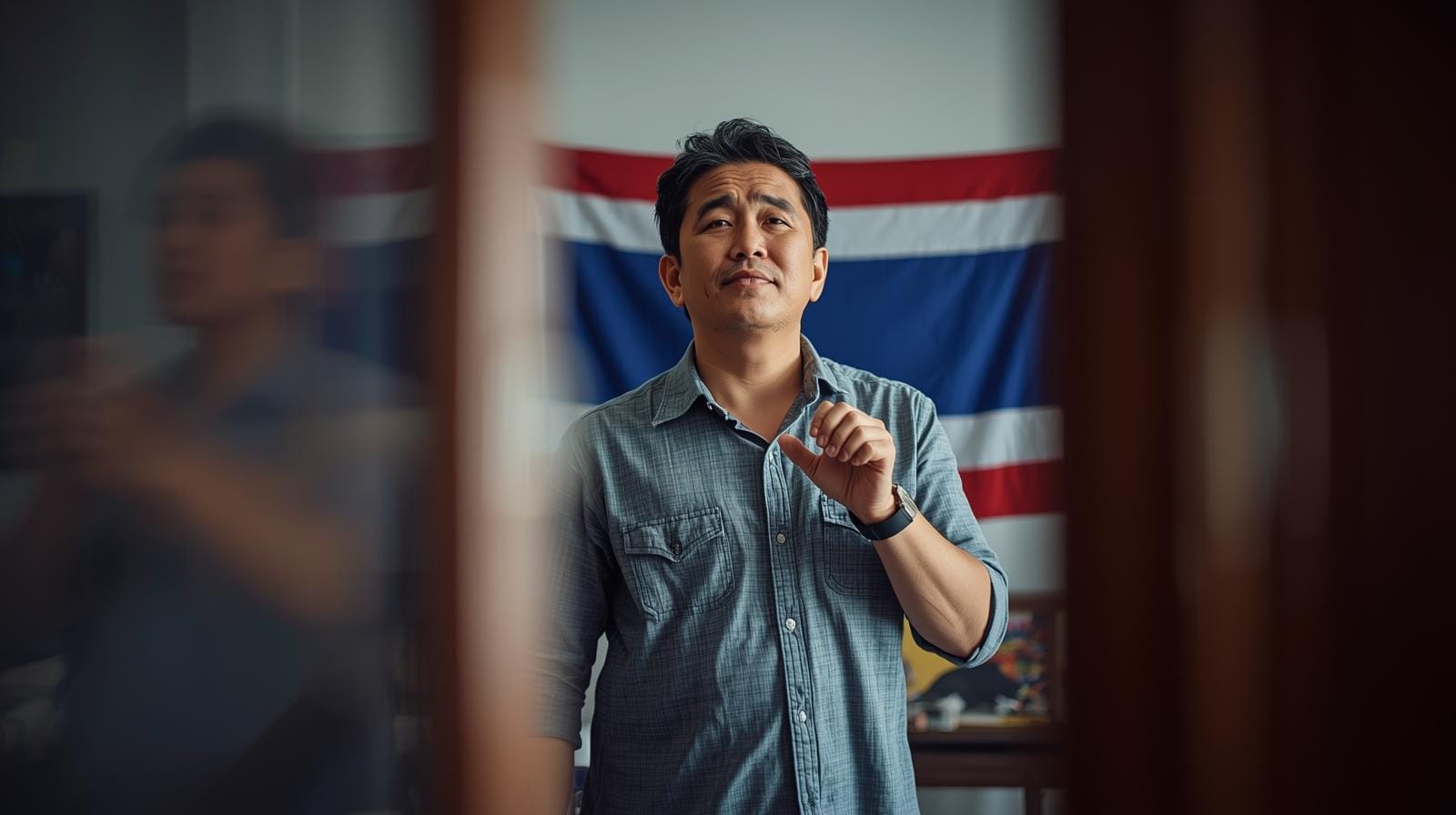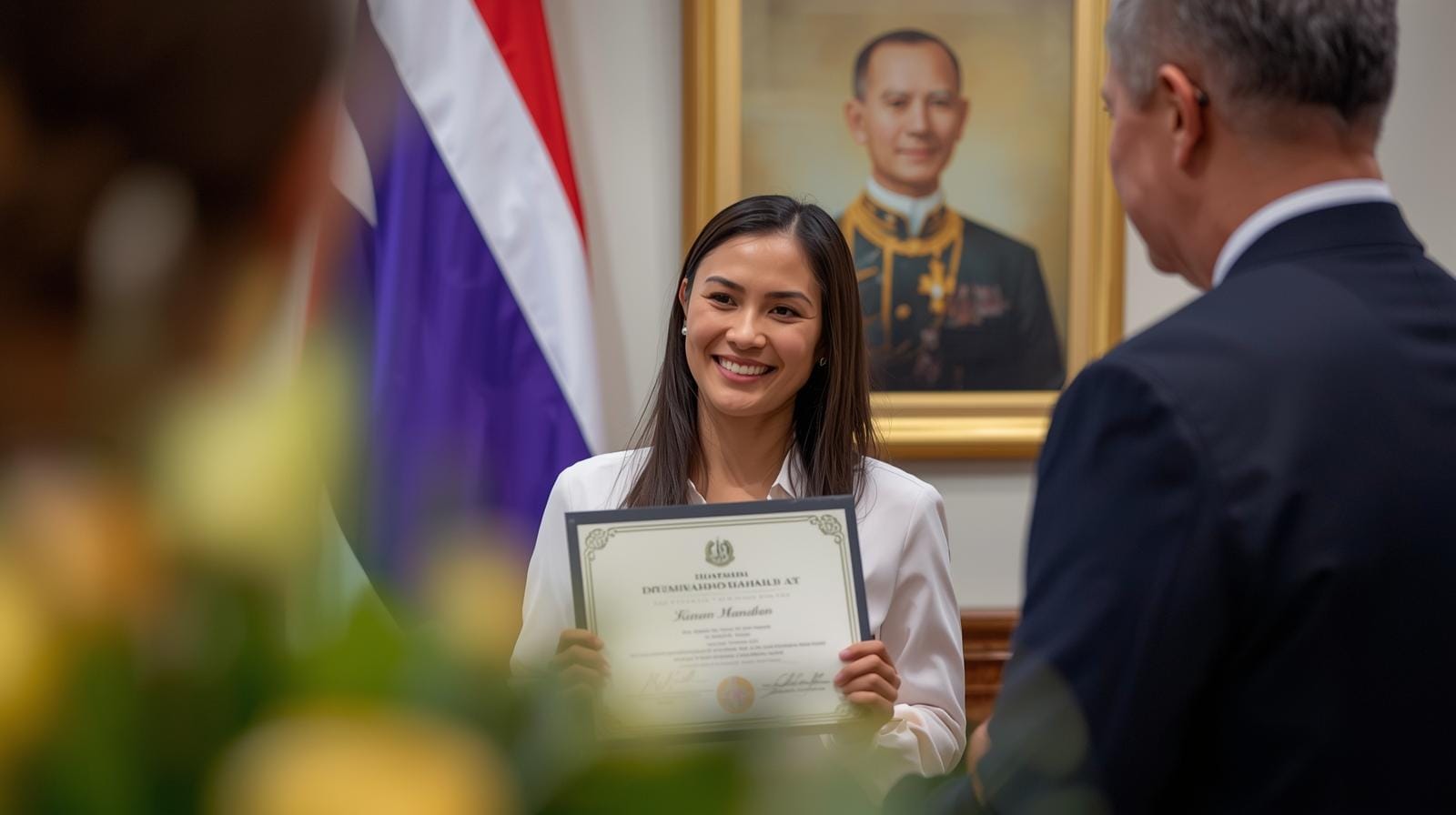A Land Expats Love – But With Strings Attached
Thailand has a way of turning short-term visitors into long-term residents. The country consistently ranks among the world’s most popular expat havens, with an estimated two million foreigners calling Thailand home by 2025. Many expats put down roots for the rich culture, affordable living, and welcoming community. Over time, it’s natural for these “temporary” residents to feel more like locals – and to consider making it official by obtaining Thai citizenship. After all, settling in Thailand permanently means no longer worrying about visas or being treated as an outsider in the place you consider home.
"An astounding 86% of expats in Thailand report being happy with life here," a 2023 global survey found. “One way to eliminate those hurdles is to become a Thai citizen through naturalization,” advises a Thai legal guide, noting how citizenship erases headaches like annual visa renewals and 90-day check-ins. For long-term expats who’ve built careers and families here, the appeal of fully “belonging” in the Land of Smiles is powerful. Yet the journey from expat to citizen is neither quick nor easy – it demands commitment, patience, and plenty of paperwork. (Also read: Why the Expat Exodus from Thailand Is Overblown)

Who Can Become a Thai Citizen? – The Strict Criteria
Gaining Thai citizenship isn’t as simple as clocking a few years in-country. The eligibility requirements are strict and set in law, ensuring only well-integrated, upstanding foreigners qualify. First and foremost, you must be an adult – applicants under 18 generally don’t qualify on their own (though children can sometimes obtain citizenship alongside a naturalizing parent). More critically, you typically need to hold Permanent Resident status for at least five years before even applying to naturalizeg. In practical terms, that means a long stay in Thailand on a Residence Permit – simply having a work visa or marriage visa isn’t enough. Those five years of residency should be continuous and legal, demonstrating your long-term commitment to living in Thailand.
Then come the financial and moral benchmarks. You’ll need a stable income and tax history in Thailand – authorities look for evidence of gainful employment or business income and filed tax returns for at least three years. If you’re single with no Thai family ties, the bar is high: a monthly income of at least ฿80,000 (about $2,300) is expected, whereas those married to a Thai or with Thai children can qualify with ฿40,000 per month. A clean criminal record is another must-have; any serious offenses can derail an application. Finally, Thailand puts a premium on cultural integration – applicants must show proficiency in the Thai language and an understanding of local customs. This includes a formal Thai language test as part of the process, where you’ll need to converse in Thai (and yes, even sing the national anthem to prove your language ability) to satisfy officials. It’s a comprehensive checklist aimed at ensuring new citizens are truly part of the national fabric.
“The person has lived in Thailand with permanent resident status for a minimum of five years,” one official guide to naturalization emphasizes. “If the applicant has no relations to Thailand, he/she must have an income of at least 80,000 THB/month (40,000 THB if married to a Thai),” Thai regulations stipulate, underscoring the financial commitment expected. In short, Thai citizenship isn’t handed out lightly. Compared to getting a long-term visa – which Thailand recently streamlined into just seven categories – earning a passport demands deeper roots. But for those who meet the criteria, it opens the door to rights and opportunities far beyond what any visa or even permanent residency can offer.
(Read: Thailand’s Visa Overhaul 2025: 17 Categories Down to 7)

From Resident to Citizen – Navigating the Process
Meeting the qualifications is only step one – the naturalization process itself is a journey. It usually begins by securing Permanent Residency (PR) in Thailand, since most foreigners must be PR holders for five years before they can apply for citizenship. (Exceptions exist – for example, foreign spouses of Thai citizens can sometimes apply with fewer years of residence – but the PR-first route is the norm.) Obtaining PR is an involved process of its own, with annual quotas (typically 100 approvals per nationality per year) and interviews, but once you have that coveted red “Certificate of Residence” book, the door to citizenship opens a crack. After the required years as a resident, you submit your citizenship application through the Special Branch of the Royal Thai Police in your area of residence. This isn’t a casual drop-off of forms; you’ll need to compile a thick dossier of documents. Expect to provide everything from passports and work permits to proof of address (Tabien Baan household registration), tax receipts, and recommendation letters from Thai citizens.
Once your application is in, patience becomes your closest ally. The review process can take many months or even a few years. Authorities will meticulously vet your background and documents. Part of the process involves an in-person interview entirely in Thai, conducted by an official committee. In this interview, you’ll answer questions about yourself and why you want to become Thai – all in the Thai language – to demonstrate your fluency and integration. Uniquely, applicants are also asked to sing Thailand’s National Anthem and Royal Anthem during the interview as a further test of language ability and cultural respect. Don’t be surprised if, later on, immigration officers make a home visit to verify the details you’ve provided – checking that you live where you say you do and that your lifestyle in Thailand is as described. If all goes well and the Ministry of Interior approves your case, you’ll be invited to attend a formal citizenship ceremony in Bangkok. There, you’ll take an Oath of Allegiance to the Kingdom of Thailand, often with a group of other new citizens, and receive your Certificate of Naturalization. Only after this oath can you apply for that prized Thai national ID card and passport, marking the end of a long road.
“Acquiring Thailand citizenship by naturalization may seem straightforward at first glance, but it can be a tiring process, particularly concerning the language,” notes one expat-focused advisoryg. Indeed, the language interview is where many applicants sweat the most. Another aspect highlights Thailand’s thoroughness: “During this stage of the application process, Thai immigration officers will visit your home to verify your submitted details,” an official outline of the process explains. From fingerprinting and fees, to interviews and home checks, to the final handshake and oath at police headquarters – the path to Thai citizenship demands endurance. There’s no shortcut through the bureaucracy (no direct “citizenship by investment” exists here), so applicants must be prepared for multiple steps and a fair bit of waiting. The reward at the end, however, is lifetime freedom to live and thrive in Thailand with all the rights of a local.

Hurdles, Rewards, and Realities of Going “All In”
It’s often said that “Thailand is easy to visit but hard to stay.” The citizenship quest embodies that sentiment – achievable, but laden with challenges. One major hurdle for many expats is language. Living in Thailand without speaking much Thai is possible (thanks to English-speaking circles and Thai people’s accommodating nature), but naturalization forces you out of that comfort zone. Mastering Thai reading and writing isn’t strictly required, but you do need to speak and comprehend Thai well enough to pass the interview and sing patriotic songs on cue. This can be daunting, especially for those who arrived in mid-life or later. Then there’s the time factor: from the day you start pursuing permanent residency to the day you hold a Thai passport can easily span 6–10 years or more. Some applicants report waiting 1–3 years just for their citizenship approval after applying, during which life feels in limbo. Others decide the hurdles are too high and opt for alternatives like the 10-year Long Term Resident (LTR) visa or the renewable Elite Visa, which offer many benefits of staying in Thailand without the commitment of citizenship. Indeed, relatively few Western expats end up naturalizing, often because of the language requirement or because they’re content renewing visas. But those who do take the plunge tend to be deeply invested in Thailand’s future – they’ve married into Thai families, built companies, or simply developed a profound attachment to the country.
For those who persevere, the payoff is significant. Thai citizenship grants rights that no visa can confer. You can own land and property freely in your own name – no need for 49% foreign ownership limits or nominee arrangements. (Recent moves to loosen foreign business rules signal progress, but only citizenship truly wipes away those restrictions.) You gain the right to vote in Thai elections and even run for certain offices, integrating you into civic life. You’ll have access to local financial services that were off-limits before – Thai bank loans, mortgages, and easier bank account openings come to mind – without fears that a visa hiccup could freeze your funds. And socially, being a khon Thai (Thai person) means you’re no longer automatically viewed as a transient outsider. You carry the same ID card as your neighbors and in many situations will be treated just like any other Thai. It’s a profound shift in status after years of being in a gray zone between tourist and true local. To be clear, naturalizing doesn’t mean giving up your original identity or citizenship – Thailand, despite some ambiguity, generally allows dual citizenship for naturalized citizens, meaning you can keep your original passport. In the end, the decision often comes down to how certain you are that Thailand is your forever home. Some expats joke that the process is a hazing ritual – “Thailand’s final test of your dedication.” But for many, especially those with Thai spouses or children, the ability to fully belong and ensure stability for their family is worth every hoop jumped through.
“It’s as if policies were altered to push expats out slowly,” one long-term retiree lamented about Thailand’s tightening visa and financial rules. This sentiment reflects why, despite the tough road, some expats pursue citizenship – to never again worry that changing rules could uproot their lives. On the flip side, Thailand does grant citizenship to thousands of people each year, proving it’s far from impossible. In 2021 alone, over 5,000 individuals were granted Thai nationality (many from long-rooted communities), showing that persistent applicants do succeed. The rewards – from unrestricted property rights to the pride of truly calling Thailand home – can make the years-long journey worthwhile. And with reforms underway to welcome foreign talent and investment even those who don’t take up citizenship will find it easier to live and work here. But for the fully committed, a Thai passport is the ultimate integration – a lifelong membership to the place you love.

Embracing a New Nationality – Final Steps and Tips
Deciding to become a Thai citizen is deeply personal. It means embracing Thailand not just as a place you live, but as part of your identity. Before taking that leap, it’s wise to reflect on your long-term plans. Are you prepared to integrate into Thai society in ways you might not have as an expat – learning the language deeply, perhaps adopting some local customs more formally, and even subjecting yourself to Thai laws and duties (for instance, male citizens of eligible age can be called for military conscription)? If the answer is yes, then preparation is key. Start early with Thai language classes; being comfortable in Thai will make every step, from paperwork to interview, far smoother. Keep impeccable records of your visas, extensions, taxes, and addresses – the citizenship application will probe into your history in Thailand in detail. It can also be extremely helpful to talk to others who have obtained citizenship. They can offer insight into the interview questions, the vibe of the ceremony, and bureaucratic nuances (like how to follow up politely if your application seems delayed). Thailand’s expat forums and communities include a few naturalized citizens who often generously share tips for those coming after them.
Don’t hesitate to seek professional guidance as well. Given the complexity of Thai immigration bureaucracy, many applicants consult with legal experts or specialized firms who have experience shepherding people through PR and citizenship. Engaging a knowledgeable advisor doesn’t guarantee success, but it can prevent costly mistakes in your application and ensure you’re fully ready for each phase. Services like Thai-Co’s immigration consultants specialize in guiding expats through Thailand’s residency and citizenship processes – from organizing Thai-language documents to prepping for the interview. Ultimately, taking on Thai citizenship is a commitment to becoming part of the nation’s story. It’s not for everyone, and that’s okay – Thailand offers plenty of ways (long-term visas, permanent residency, etc.) to live happily in the Kingdom without a passport. But if you do choose this path, you’ll join the ranks of those rare farang who can truly say Thailand is “mein banh” (home) in every sense. You’ll stand for the King’s anthem not as a guest, but as one of Thailand’s own. And that, for many who have made lives here, is a profoundly rewarding end to the expat journey.
“Don’t let bureaucracy hinder your dreams of calling Thailand home,” one citizenship guide encourages. Indeed, while the naturalization road can be long, it culminates in a new beginning – life as a Thai. For those ready to make the leap, careful planning and maybe a bit of expert help can make all the difference in turning the dream of dual identity into reality. In the end, “better to cross the river once than carry the bridge forever,” as a local saying goes – in other words, tackle the big challenge now, and you’ll enjoy the freedom on the other side. Becoming a Thai citizen is that one big crossing that, once complete, opens a lifetime of security and belonging in the Land of Smiles.

Frequently Asked Questions
Q: Can I keep my original citizenship if I become a Thai citizen?
A: Yes. Thailand generally allows dual citizenship for naturalized citizens. There is no requirement to renounce your original nationality when you obtain Thai citizenship. Many expats maintain two passports – their Thai one and their birth country’s – perfectly legally. The only exception can be in certain cases of people born stateless in Thailand, but ordinary foreign naturalization applicants do not have to give up their first citizenship.
Q: Do I need to be fluent in Thai to get Thai citizenship?
A: You need a solid command of Thai, but not absolute fluency. Applicants must demonstrate Thai listening and speaking ability and will be tested on this during the process. This includes conducting an interview in Thai and even singing the Thai National Anthem. You don’t have to speak Thai like a native, but you should be conversational and comfortable enough to show you can integrate linguistically. Basic reading and writing in Thai can help (and might be informally quizzed), but the core requirement is oral proficiency.
Q: How long does it take to become a naturalized Thai citizen?
A: It’s a lengthy process. First, you need at least five years of permanent residency before you can apply. After applying, the naturalization approval can take anywhere from one to three years on average – sometimes longer. Thai authorities conduct thorough background checks and there’s often a queue of applicants. In total, from the start of residency to citizenship ceremony, it could easily be 6-10 years. Patience is essential; there is no expedited “fast track” for most people, so it’s best to view citizenship as a long-term goal and plan accordingly.
Thinking about Thai Citizenship?
Get personalized advice from experts on navigating Thai visa and citizenship processes.
Button: Book a Free Consultation






